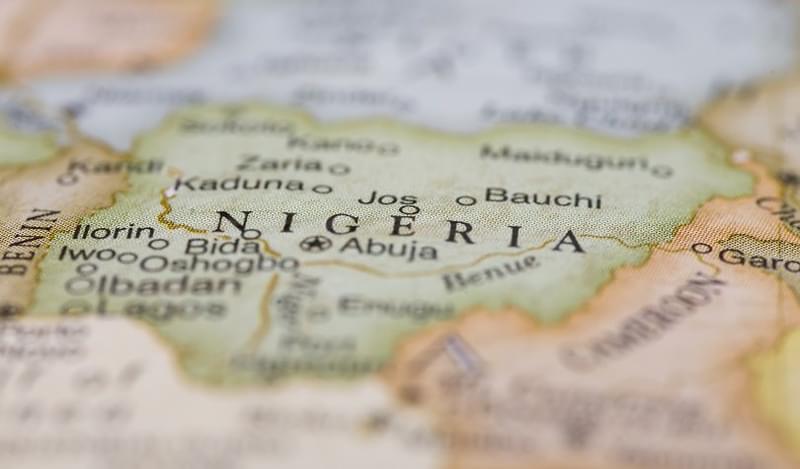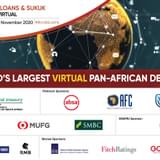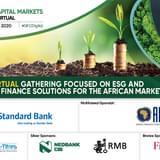The Nigerian government failed to reach its targets of raising NGN95bn in local debt sale on Wednesday. The auction recorder mere 41% uptake, raising NGN39bn in 5, 10 and 20-year local currency bonds.
Nigeria’s Debt Management Office (DMO) sold NGN20 worth of 2036 debt at 15.94% and NGN14b of 2026 notes at 15.98%. It issued NGN5bn 5-year notes at 15.48%, less than 15% of the NGN35bn planned initially.
Low demand resulted from a combination of internal and external factors, namely an overpriced currency and a recent exodus of capital from EMs, observers concluded.
“Looking at the auction, it was massively underwhelming, with 2021 offering NGN35bn and subscription at 16.4bn, the 2026 offering NGN25bn and NGN17.5bn subscribed, for instance,” said Joe Delvaux, a senior fund manager at Duet Asset Management.
“Of that, how much was actually fresh capital? It shows that interest generally has been low, and even local demand is low too. As a result, yields spiked.”
The naira has been battered by a fall in oil revenues over the last two years, dropping 47% against the US dollar to around 315 on official exchanges. Up until June 2015 the Central Bank kept the currency pegged at 200 per US dollar, which saw black market prices go as high 375.
While the move to devalue the currency was a positive for investors, it became increasingly clear that it was not allowed to float freely, and black market rates climbed into the 400s, relative to the official 315/US dollar.
“In reality, prevailing issues in Nigeria are not being addressed. The FX rate is officially free-floating, but in practice it is not the case,” Delvaux stressed.
As an example, the asset manager pointed to a recent case, where a bank had been penalized for conducting FX transactions above a certain permitted threshold. And on Wednesday last week it transpired that the government was willing to go even further to tackle currency speculation transactions, threatening to give a two-year jail term to anyone holding dollars in cash for more than 30 days.
“As long as FX market liquidity remains so poor, around US$5mn to US$15mn dollars a day, with a growing backlog of investors who cannot get their money out, you cannot except fresh capital to start coming in,” Delvaux said.
While admitting that there are always unknown and unaccounted factors coming into play with large issuances, particularly for the biggest economy in Africa, the auction made it clear that pricing was off-target and points to an overpriced currency.
“Looking at the bond pricing – June 2019 saw a 50bp surge from last week in yields, Jan2022 saw a 40bp rise, and also considering the NDF curve – it appears that more and more people are factoring in a second devaluation of the naira,” Delvaux noted.
With the Central Bank continuing to prop up the currency with “emergency” interventions for certain industries (e.g. the airlines), which have also been largely underwhelming relative to the expectations, few are left under the illusion that the currency is freely floated.
“All these factors indicate that the stresses on the system are much, much bigger than the CB likes to admit.”
According to the National Bureau of Statistics (NBS), inflation rose to 18.3% from 17.9% in September, increasing for the 11th consecutive month.
Yields on Nigeria’s US$500mn of securities due July 2023 have soared almost 160bp to 8.47%, driven by the aforementioned domestic factors, but also external pressures – namely, the ongoing collapse of global EM debt on the back of Donald Trump’s victory, growing US interest rate hike expectations, and stagnant oil prices.
In order to begin fixing the situation, the government has to send a clear message that it is willing to address some of the more serious problems facing the economy and take new measures to attract foreign investors.
But political and public pressure makes it challenging for Buhari’s administration. Earlier this month, Nigeria's senate rejected a proposal by President Buhari to borrow US$30bn to fund infrastructure development and make up for oil-related budgetary shortfalls.
Additionally, the government is concerned that allowing for a full-scale depreciation of the naira would be devastating on the country’s population.
“Nigeria is a large economy. While oil makes up the largest part of its economy, it is not the sole factor, as it is in other countries, which suffer from the Dutch disease and see very thin diversified revenue streams. Developing infrastructure would provide a platform for economic growth in Nigeria, but it requires a lot of investment from the government,” Delvaux stated.
“The devaluation will be felt across the spectrum of society, and will inevitably be an unpopular move – that is why there is still resistance within the government. Unfortunately, there is no alternative option, partly because mistakes made in the past that could easily have been avoided,” he added, pointing specifically at the original devaluation that was not allowed to run its course.
It's not all doom and gloom for the embattled African state. Last week, Nigeria reached a US$5.1bn settlement to reimburse foreign oil companies including Exxon Mobil Corp. and Royal Dutch Shell Plc for past operating costs for the period 2010-2015.
While the country still owes the companies US$2.6bn from operations this year, the agreement should unlock capital inflows into the country that up until now were hanging in balance due to legal uncertainty. According to Petroleum Minister Emmanuel Kachikwu, spending by international oil giants could reach US$15bn.
Another boost is expected to come from large international lenders. The World Bank will allocate up to US$600mn of support funds to Nigeria’s agricultural sector, World Bank official Shehu Salau indicated on Thursday.
But opinions differ on whether the international debt markets will be open for Nigeria in the short-term, particularly while inflation is still rising and the currency remains volatile. Delvaux thinks that for now, there is no incentive for investors to buy into Nigerian assets, if they know their value will drop significantly at some point soon.
“In theory, the legislation passed recently on FX deals is very innovative and progressive, but its practical application is being undermined by pressure from the Central Bank. First they must stop putting pressure on market participants. Second, they must let the currency devalue naturally. It will likely overshoot initially, like it did in Russia or Kazakhstan, but that will correct itself in the long run,” the expert concluded.
Others suggest that smaller, target issuances, particularly in project and green finance, should be more successful. In particular, this relates to Nigeria’s planned climate bond market debut – a NGN20bn sovereign green bond, which is expected to be issued in Q12017 and provide low carbon and robust climate infrastructure funding the country urgently needs.
“They’ve indicated multiple times that the initial green bond sovereign will be primarily open to domestic investors,” a sustainable finance expert working on the issuance told Bonds & Loans. “That takes some of the currency risk out of the equation, as it will source internal capital from wholesale or retail investors in Nigeria.”
“The amounts and range of projects initially discussed suggest that it will serve as a “test-drive”, and we do not expect it to face the problems associated with the recent vanilla bond. They are taking it step by step, holding consultations and going for a modest sized domestic green bond against tangible assets within the Nigerian economy, so I don’t foresee too much difficulty in this case.”
Some have pointed to climate and project bonds as a safe-haven in struggling economies, offering some level of immunity to the traditional risk factors and inviting a wider base of investors. While for now that may be rather optimistic, the source indicated that “green investing” certainly has strong long-term prospects in Nigeria and the whole region.
“International and development banks have provided specific allocations to so-called aggregation/pooling concepts to help bundle together smaller initiatives or projects into large packets that could attract more serious investment - so green bonds or not, there will be more opportunities in “green investing” in Africa in general,” the source concluded.
But for now, the priority for Nigeria’s government has to be addressing the most painful problems and clearing the path for foreign capital to flow.
“You can expect rates to eventually go up locally, and another devaluation is likely to happen soon, and then Nigeria will become a fantastic option for investors,” Delvaux concluded. “But in the short term there are other EM opportunities that are more straight-forward and offer better risk-return. Here you would just be asking for a bruising.”









